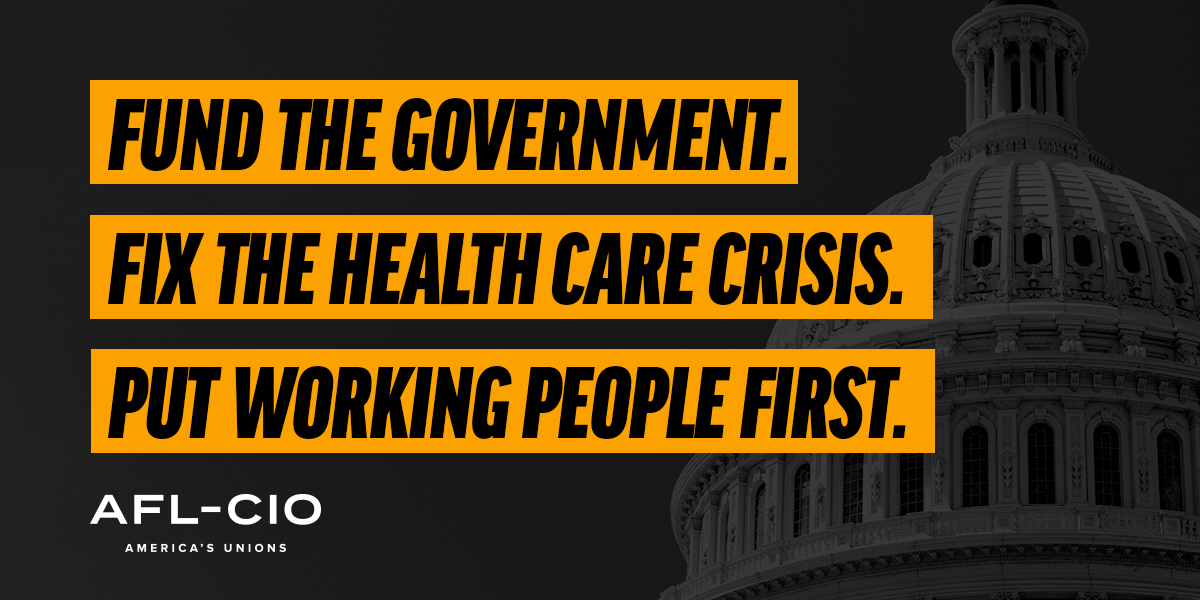Tell Congress to Fund the Government, Fix the Healthcare Crisis, and Put Working People First
Dear LEO members,
On Wednesday, October 1, Trump and his GOP henchmen in Congress shut down the federal government by refusing to remove the massive cuts to Medicare and Medicaid from what they like to call their One Big Beautiful Bill. The loss of healthcare coverage by millions of Americans that will occur if this bill passes in its current form will cost tens of thousands of lives each year. That strikes me as pretty damned ugly.
The AFL-CIO -- the national federation representing most of the USA's 16 million union members, including the American Federation of Teachers -- estimates that if Trump's budget goes through in its current form, 424,245 Michiganders will lose their health care coverage.
LEO Lecs will not be immune from this disaster. Most vulnerable will be those with less than a 0.5 appointment. If they don’t have a partner or that partner doesn’t have work-based coverage, they may well depend on the Obamacare exchanges to buy their healthcare. The subsidies for those using the exchange are a big part of what is on the chopping block – it is estimated that those who previously relied on these subsidies would, on average, see the price they pay for their health care more than double. But even for those who have full UM coverage, these changes are expected to push up health care premiums for everyone, because those with insurance will now have to pay to cover the costs of treating the additional millions of uninsured people who will turn up in emergency wards long after they should have got treatment.
The government shutdown is painful too, of course, and it will get more painful over time. The AFL-CIO estimates that, in Michigan alone, 29,822 federal workers will be “furloughed,” meaning they are no longer doing their work and will go unpaid. Thousands more whose work has been deemed "essential" -- think air traffic controllers, health care providers in the VA, etc. -- will be required to work but will not be paid either. Hard to blame them if they quit, which may be part of the larger (think Project 2025) plan: radically reduce the quality of public services, so you can better make the case for privatization.
But as Ezra Klein argues, the shutdown is the main leverage that we currently have to force the Trump regime to back down on the most deadly elements of its outrageous budget bill. In this regard, the shutdown is analogous to union members’ decision to strike: it is costly to us, and we don’t do it lightly, but it imposes a cost on “the boss” and shows them (and everyone else who is watching) that they do not have all the power, much as they might like to imagine that they do.
Unless Republicans vote to eliminate the Senate filibuster, 60% of Senators must vote to pass this budget bill. That means that even if all Republicans support the bill -- which every last one of them currently does -- they need 8 votes from Democratic Senators. They've got three Dems to vote for their deadly bill and are hoping to get five more "moderates" to cross the line and vote for it.
We need to stop that from happening. Our labor movement and the movement that is emerging under the banner of Indivisible and allies networks will develop and share additional tactics in the coming days, but as a first step…
The AFL-CIO recommends that we phone the Republican Speaker of the House and Senate Majority Leader to tell them to take the health care cuts out of the budget.
Indivisible recommends that we call our Michigan Senators -- Peters and Slotkin are both Democrats -- and urge them to hold the line until Trump backs down on the health care cuts.
I urge you to DO BOTH and then let the Huron Valley Area Labor Federation (HVALF)’s Rapid Response Network know that you took this step by filling out this short form!
In solidarity,
Ian Robinson, LEO member and HVALF President
Image of black text on yellow writing superimposed in front of a faded image of the top of the U.S. Capital building with the words : “FUND THE GOVERNMENT. FIX THE HEALTH CARE CRISIS. PUT WORKING PEOPLE FIRST.”

